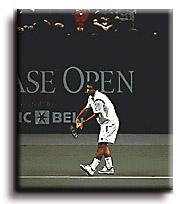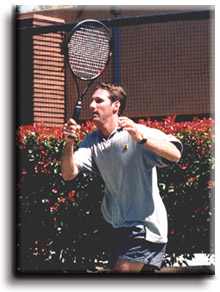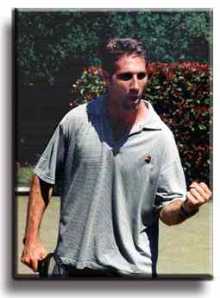
Riding the Wave of Momentum
by Jeff Greenwald
When it comes to athletic competition, everyone
talks about momentum -- psychological momentum, when everything is
moving in the right direction for one competitor or another. As I write
this, Pete Sampras has won his 22nd consecutive match and is moving
toward his 13th Grand Slam, the most in tennis history. Pete's recent
performance defines the word "momentum."
 |
Pete's recent performance defines "momentum."
Psychological Momentum refers to the perception
that a player is moving toward his objective, thereby resulting in
greater levels of energy, perception of control, enthusiasm, and
motivation (Journal of Sport & Exercise Psychology). Another model
within the sports psychology literature defines psychological momentum
as a "positive or negative change in cognition, affect, physiology,
and behavior caused by an event or series of events that will result in
a shift in performance outcome."
Most of us have experienced it in one match or
another, that intangible feeling that makes us seem unstoppable in the
moment; as if fate was on our side. In this highly aroused state we feel
an almost supreme confidence in our ability to perform. The nerves are
gone and so is that constant internal dialogue. We are ready to roll.
During this psychological shift we feel in total control and enjoy every
second of it. But how to obtain momentum and take advantage of its
awesome power,… that is what defines champions.
Since momentum is a shift in our perception of a
given match situation, it follows that we do have some control over the
experience. Though it is true this shift occurs in response to a
particular event (i.e. a successful let cord volley on a key point), we
can improve our ability to generate momentum on our own. For example, at
4-4, deuce in the third set, your opponent misses an easy overhead
giving you break point. You want to capitalize on your opponent's missed
opportunity and literally tell yourself you are in charge now.
Invariably, your opponent may also experience a sudden shift in
confidence and become more nervous. As your opponent begins to
second-guess, you immediately perceive you are in the "driver's
seat", a momentum shift has occurred. So don't miss out on this
opportunity to harness momentum when it presents itself.
 |
Momentum gives us
a heightened sense
of confidence
The reason momentum is so powerful is because of
the heightened sense of confidence it gives us -- the most important
aspect of peak performance. There is a term in sport psychology known as
self-efficacy, which is simply a player's belief in his/her ability to
perform a specific task or shot. Typically, a player’s success depends
on this efficacy. During a momentum shift, self-efficacy is very high
and players have immediate proof their ability matches the challenge. As
stated earlier, they then experience subsequent increases in energy and
motivation, and gain a feeling of control. In addition, during a
positive momentum shift, a player’s self-image also changes. He/she
feels invincible and this takes the "performer self" to a
higher level.
It is important to know, however, that a
psychological momentum shift does not happen when a player is feeling
anxious. If your mind is racing or you feel a pit in the stomach, most
likely you will not be able to capitalize on the momentum opportunity.
Under these circumstances, confidence will not be enhanced. Therefore,
it is critical to remain loose and relaxed physically, which is
accomplished through consistent deep breathing and positive self-talk
before and during matches.
Next time you are watching a tournament, observe
the shifts in momentum. Often, they are quite obvious. Players
experiencing negative shifts in momentum will typically hang their heads
or curse the Gods on big points. At the same time, you may notice their
opponents moving just a bit more confidently, with shoulders and head
more upright, a seemingly greater intensity, and a spring in their walk
between points.
 |
Don't miss an opportunity
to harness momentum
when it presents itself
Specific physiological changes in a player's body
language often accompany momentum shifts. What is exciting is that we
can learn to create our own internal momentum at key times in matches,
with the right mind set and on-court behavior. When playing a match, try
and carry yourself upright between points and increase your intensity
after a well-played point. Do this on a consistent basis and I guarantee
that you will create a more positive experience that you can feel
inside.
There is, however, a loophole in psychological
momentum. It also happens that when a player experiences a negative
shift in momentum, he/she can actually begin performing better under
certain circumstances. That is, when a player senses momentum slipping
away, he/she may begin raising intensity to counteract the possibility
of a momentum shift. The edge often goes to the player who perceives the
shift first and can capitalize on it best.
What makes Sampras so great is his uncanny ability
to capitalize on the momentum and close out matches. Once he gets ahead,
his serves become harder, his volleys crisper, and passing shots seem to
drop in with ungodly accuracy. Sampras was quoted recently in the San
Francisco Chronicle:" I just hope I can ride this wave out."
Well,... if he believes he can, I think he will.
Follow these seven ways to create and capitalize on
momentum then watch your game go to a new level
-
Stay physically relaxed before and during
matches.
-
Keep your shoulders and head upright between
points.
-
Raise your intensity level after successful
shots.
-
Visualize yourself running away with the match;
total confidence.
-
Try shifting your perception (positive) in
practice matches at key times.
-
Use positive self-talk (i.e. "Here we
go.") during practice and matches.
-
Always think that momentum is on your side of
the net.
 Jeff Greenwald,
M.A., Sports Psychology Consultant, is a former world-ranked tennis player and top
Men’s Open player in Northern California. He has consulted with college players,
ranked junior tennis players, recreational and pro tennis players on both a national and
international basis. Jeff trained with the late Tim Gullikson (coach of Pete Sampras) and
recently with world-renowned sports psychologist, Dr. James E. Loehr.. He also coached
Nationally ranked juniors in Germany from 1993-1995, while competing as the
internationally designated player for the Uhlenhorster Tennis and Hockey Club in Hamburg,
Germany. Jeff is currently conducting both national and International mental training
seminars for both adults and juniors. He was voted 1997 Men’s Open player of the Year
in Northern California. Readers are encouraged to email their thoughts to
the author at jgedge@ibm.net. Jeff Greenwald,
M.A., Sports Psychology Consultant, is a former world-ranked tennis player and top
Men’s Open player in Northern California. He has consulted with college players,
ranked junior tennis players, recreational and pro tennis players on both a national and
international basis. Jeff trained with the late Tim Gullikson (coach of Pete Sampras) and
recently with world-renowned sports psychologist, Dr. James E. Loehr.. He also coached
Nationally ranked juniors in Germany from 1993-1995, while competing as the
internationally designated player for the Uhlenhorster Tennis and Hockey Club in Hamburg,
Germany. Jeff is currently conducting both national and International mental training
seminars for both adults and juniors. He was voted 1997 Men’s Open player of the Year
in Northern California. Readers are encouraged to email their thoughts to
the author at jgedge@ibm.net.
|